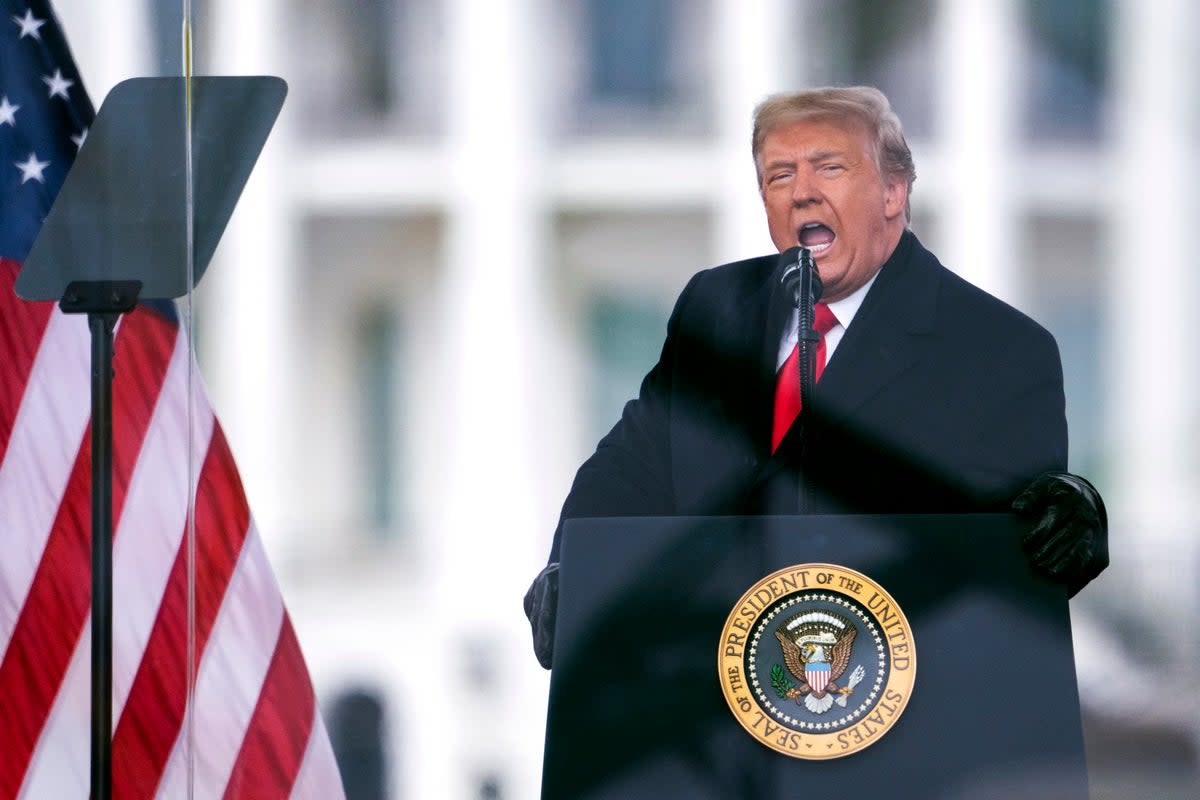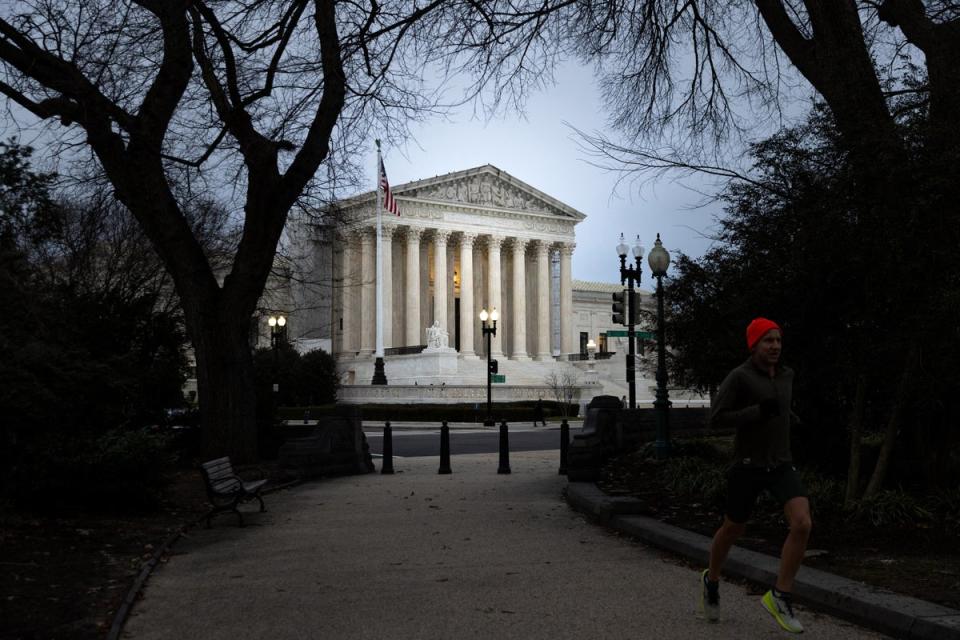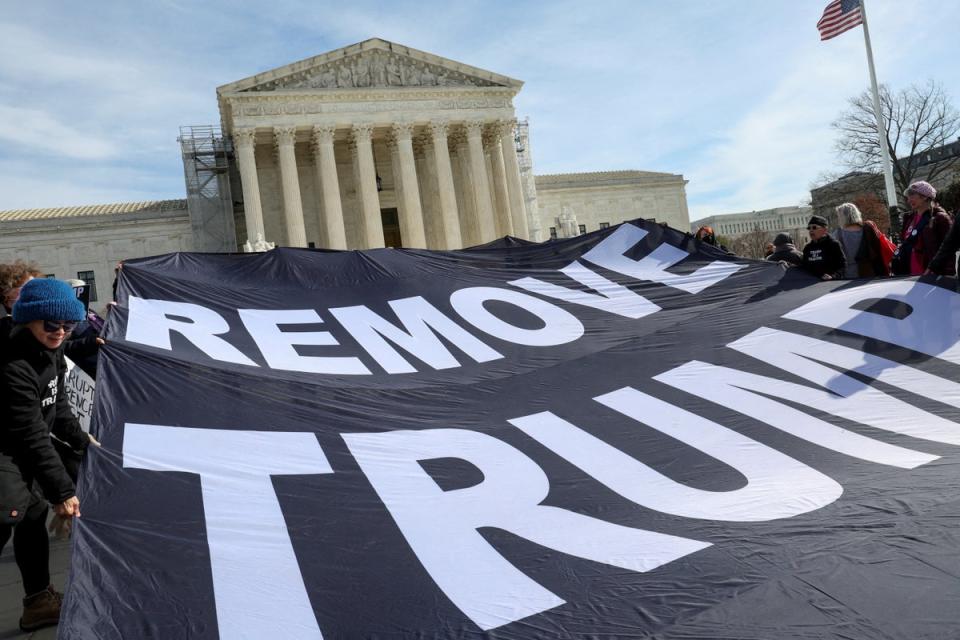Donald Trump got exactly what he wanted from the Supreme Court

The US Supreme Court might have just insured that Donald Trump will not face a criminal trial for his attempts to overturn the 2020 presidential election before the next one. And he may end up avoiding a trial altogether, if he wins the presidency in November and tries to tell his administration to shut down the cases against him.
The former president has repeatedly claimed that he is “immune” from prosecution for actions committed while in office, including, allegedly, leading a multi-state scheme to pressure officials to overturn election results, and failing to stop a mob of his supporters from storming the US Capitol to do it by force.
A federal judge and a federal appeals court have knocked down that defence in damning rulings that outline why, exactly, the president can’t evade liability for crimes committed while in office. But on Wednesday, the nation’s highest court – where three justices were appointed by Mr Trump – agreed to take up the case after he asked them to hit pause on those orders, giving the former president yet another victory in his time-tested legal strategy: delay, delay, delay.
The former president’s pile of civil and criminal cases have created Russian nesting dolls of courtroom battles, with seemingly every case spinning off into appeals courts and separate debates over evidence, gag orders and legal strategies, all of which are buying him time and increasing the likelihood that he won’t face a trial until after the election.
Supreme Court justices will hear oral arguments on his “immunity” defence on 22 April. If a ruling comes sooner than later, perhaps in May, and the case is allowed to continue, a jury won’t be selected until later this summer, with a trial wrapping up in October, at the earliest. If the court rules in June, a trial may not come until 2025.
That timeline gives Mr Trump exactly what he wanted: US District Judge Tanya Chutkan, who is overseeing his election conspiracy case, won’t be able to get through pretrial motions, jury selection, a trial and a verdict before Americans cast their ballots for the next president.
The former president has not given any indication that he plans to accept his potential loss, no matter the circumstances. If he loses, Mr Trump could end up evading a trial for charges connected to January 6 while Americans brace for the next one.
“If the Supreme Court does not allow this matter to be adjudicated this year, they will be complicit in this grave offense,” according to Norm Eisen, former special counsel to the House Judiciary Committee majority during Mr Trump’s first impeachment.
“They will be aiding and abetting in this failure of accountability and this grave danger to American democracy,” he told reporters in a virtual briefing on Thursday. “Americans like their democracy. They want to keep it. … They want an answer to the question of whether Trump previously criminally opposed the powers he is seeking to regain.”
Tom Joscelyn, who drafted the final report from the House Select Committee that investigated the events surrounding the attack on the Capitol, said Americans are entitled hear the facts of the case and evidence at trial.
“These people would not have gone down to the Capitol to stop the peaceful transfer of power if it was not for Trump sending them there,” he told reporters on Thursday. “There are so many of the small fish in the sea who have been already tried and convicted for doing what Trump wanted them to do ... It would be a shame if the ringleader of that wasn’t also tried and held accountable.”

In their unanimous rebuke of his arguments earlier this month, a panel of appeals court judges wrote that “citizen Trump” is not shielded by presidential immunity, and that his “alleged efforts to remain in power despite losing the 2020 election were, if proven, an unprecedented assault on the structure of our government.”
The 57-page ruling delivered an outright rejection of his premise that a president has “unbounded authority to commit crimes that would neutralise the most fundamental check on executive power – the recognition and implementation of election results”, as well as his “carte blanche” efforts “to violate the rights of individual citizens to vote and to have their votes count”.
Mr Trump went to the Supreme Court to ask for the justices to pause that ruling as he mulled an appeal. Federal prosecutors asked the justices to let the lower-court decisions stand, and for the case to keep moving, raising the prospects that if it doesn’t, Mr Trump could end up winning the election only to stop them once in office.
Mr Trump asked the court to pause the lower-court ruling on 12 February. Special counsel Jack Smith’s office asked justices to deny that request, or at least take up the case on a rapidly expedited schedule with oral arguments on 4 March.
Instead, the Supreme Court let those requests languish – for more than two weeks.
Justices could have issued an order at any point within that time.
Meanwhile, the defendant in one of the most significant criminal cases in American history has kept raising money for his campaign, painting himself a victim of a Democratic conspiracy, while a parallel election interference case in Georgia has instead shifted its focus to allegations of wrongdoing from the woman leading the prosecution – thanks to salacious court filings from one of his co-defendants and Trump-allied attorneys, and a circuslike series of courtroom hearings intended to undermine the prosecutors.
Justices also will issue a ruling at some point within the coming weeks over whether he should be removed from ballots for his role in the “insurrection,” after Colorado’s top court ruled him ineligible under the 14th Amendment. In front of the high court earlier this month, an attorney for Mr Trump argued that the attack was a mere riot, not an insurrection, but one that was was “shameful” and “violent” – and even “criminal”.

Mr Trump will, however, face a criminal trial in his hometown of New York City on 25 March, stemming from allegations that he covered up hush-money payments to an adult film star to avoid compromising stories of his affairs before the 2016 election.
“That case is the one measure of democratic accountability that we know is coming in 2024,” Mr Eisen said. “It is the gateway drug to the 2020 election interference. Donald Trump saw that he got away with it in 2016: there was no accountability, and that was part of what emboldened him in the shocking criminal conduct.”
If Supreme Court justices wait to issue a decision on his “immunity” claims towards the end of their 2023-2024 term sometime this summer, “they likely will have knowingly prevented voters from knowing if Trump is a convicted felon before they vote,” according to Fred Wertheimer, president of campaign finance reform group Democracy 21.
“If they wait and issue the opinion at the end of the term in June, they will have rewarded Trump’s delaying strategy at the enormous expense of the country and the Supreme Court,” he said. “There has never been anything like what Trump did in our history. Never.”

 Yahoo News
Yahoo News 
